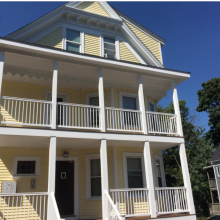What We Do
When each family arrives at Hildebrand, they find resources, services, and programming to support them throughout their journey to transition out of homelessness. Each family’s situation is unique, and Hildebrand staff work together with every family to build on their strengths and leverage resources to find stability and a permanent home.

Emergency Shelter
Hildebrand operates 157 emergency shelter units for families with children across Boston and Cambridge, which include congregate, co-shelter, and scattered-site living programs.
Hildebrand exclusively accepts families referred by the Executive Office of Housing and Livable Communities (EOHLC). On their day of arrival, each family is greeted by Hildebrand staff and welcomed with an orientation providing a complete overview of our program, including a description of services, expectations, and resources available through Hildebrand and in the family’s new community.
Families meet with their assigned case manager and housing specialist within one week of arriving to shelter to begin our work together. The initial case management meeting typically entails review, discussion, and planning related to:
- the family’s housing history
- ensuring school-aged children are in school
- understanding the family system and networks
- learning about involvement and support from extended family and friends
- documenting employment history and status
- discussing education history and needs
- addressing housing barriers or challenges the family is facing and jointly determine the options for meeting individual family needs
Case managers work to build relationships based on collaboration and mutual respect to develop and implement a family’s individual re-housing and service plan, which serve as a roadmap on the journey toward finding a permanent home.

Supportive Services
Hildebrand provides comprehensive, culturally-responsive case management and supportive services—in a variety of languages—to all families in shelter. Families and Hildebrand staff work together to overcome barriers to securing safe, stable housing and prepare families to thrive beyond their experience of homelessness.
Youth Engagement
Working with youth in shelter through our Student Success Education Initiative (SSEI) to access academic support, school-based resources, out-of-school enrichment, summer camp, and more.
Health Navigation
Partnering with community health centers, local hospitals, mental and behavioral health centers, and other providers to connect families with accessible, trauma-informed care.
Economic Mobility
Conducting a community-centered economic mobility research project, in collaboration with consultants, to inform the development of a new economic mobility program at Hildebrand.
Legal & Immigration Support
Collaborating with MIRA Coalition to provide immigration training for staff, and connecting families with pro bono legal support.

Permanent Housing
Hildebrand works closely with each family to find, apply for, and move into permanent homes. Hildebrand staff work together with families to explore and access a variety of pathways to securing a permanent home, which may include the Massachusetts Rental Voucher Program (MRVPs), Section 8 vouchers, state or federal public housing, HomeBASE, and market rate options. Hildebrand also owns 22 units of permanent housing and operates 13 units of Permanent Supportive Housing (PSH) for families who are exiting chronic homelessness.

Stabilization Services
Hildebrand continues working with families for at least two years post-shelter to support families in remaining stably housed. Over the course of the two years, families and Stabilization Services Case Managers work together to develop plans to increase economic mobility and work towards their goals. This program is proven to be effective: after two years, 95% of the families in the Stabilization Services Program stay securely housed.

Do you want to help support Hildebrand?
Contact
614 Massachusetts Avenue
Third Floor
Cambridge, MA 02139
Ph: 617-491-5752
F: 617-491-2385
